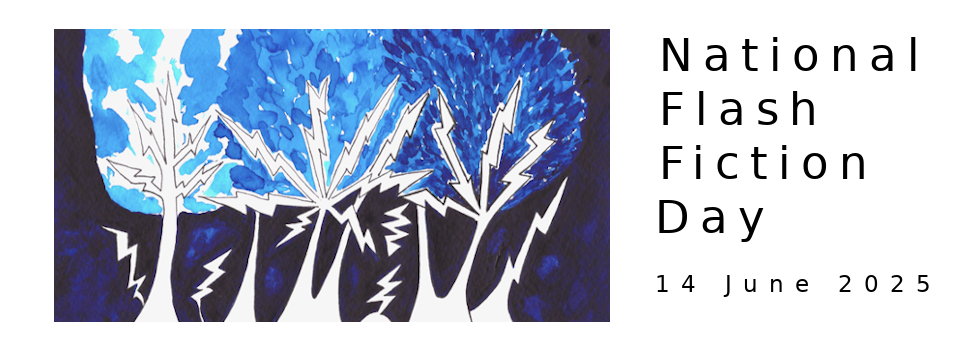Month: June 2013
Happy National Flash-Fiction Day!
Good Morning, and Happy National Flash-Fiction Day,
‘Like A Jewel’ by Pauline Fisk
Flash Fiction Shrewsbury – Pauline Fisk
[First published on http://mytonightfromshrewsbury.blogspot.co.uk/2013/06/flash-fiction-shrewsbury.html 20/06/2013]
Last night in the Shrewsbury Coffeehouse, National Flash Fiction Day was celebrated with an Open Mic and pieces of short, short fiction – very short and often very sharp too. This is a great writing – and reading – form for a busy world. If you haven’t the time to read a book, you’ve still got time for a couple of pieces of flash. That’s the idea at any rate. You can read a piece of flash in the time it takes you to wait for your bus to come along. A couple of pieces, if it’s late. And if you haven’t got time to write that novel you always reckoned you’d got in you, then you’ve got the time to write a story in five hundred words.
'Flash fiction is fiction with its teeth bared and its claws extended...' 'It's a machine of compression, the hugest of things in the tiniest of spaces, flash freakin' fiction...' 'It can be prose poetry, a whole story, a slice of sharp light illuminating a life...'
Three quotes amongst many on what is flash fiction. The name's believed to have been coined back in 1992 as the title to an anthology of very short stories, and it's a name that's stuck. Short, short stories have been written for a long time. Kafka did it, so did Chekov, and Hemingway's 'For sale: baby shoes, never worn' has been quoted to death.
However, in recent years, with the growth of the internet, more people reading on e-readers and mobile phones, and the sheer pace of life, the very short story has taken on a whole new life. People don't have much time for reading - or for writing - and the short short story has really come into its own.
Today flash fiction as a phenomenon is being written, and read, all over the world. People have different ideas about how long flash should be. 1,000 words? 50? 10? Ten's pushing it, I reckon. The good people who met at the Shrewsbury Coffeehouse last night have settled for 500.
Last year, Shrewsbury had the honour of launching the first National Flash Fiction Day on May 15th, Flash Fiction Eve. This year the town was several days in advance. Last year just a handful of people turned up with stories, and much of the evening was taken up with writing - people collaborating together, in many cases as strangers, but through the medium of writing becoming friends. ‘I haven’t written a story since I was in primary school,’ somebody said. And she and many others were back this year, raring to write more. The Shrewsbury Coffeehouse was packed.
This year there was still writing on the tables covered with rolls of lining paper for just that purpose, but where only six people turned up with stories to read, this time the running order had seventeen. At one point it looked hard to see how they’d all be fitted into one short evening, but by the end of the night when the Muse departed, everybody had read.
In just one evening, we heard about Gabriel Rosetti’s obsession with exotic animals [which he buried in his garden]; window-cleaners encountering ghosts from the past; a new annunciation for a new Virgin Queen; a couple of murder mysteries, one told from the point of view of the corpse; the experience of trench life in the First World War, the experience of being mum to a dysfunctional family, running away to join the Foreign Legion and much, much more. The stories were as diverse as the people who were there.
The names on the running order are Caroline Bucknall, Carol Caffrey, Carol Forrester, Adrian Perks, Matt James, Liz Lefroy, Barry Tench, Lisa Oliver, Katherine Dixon-Miller, Catherine Redfern, Annie Wilson, Ivan Jones, Mal Jones, Steven Lovejoy, Rosemary [you didn't leave a surname, but I loved your story], Faiza Islam [and her sister, who needs thanks for reading with a heavy head cold] and Pauline Fisk. All of these people made the evening special, and need special thanks.
Also during the evening, the Flash Fiction Shrewsbury website was launched. The town already has its own Flash Fiction Shrewsbury Facebook page, but now there’s a place for the people of Shrewsbury to post their stories. In just the couple of days the website had been up, it had been read by over fifty people in the UK, twenty-six in the US, and one each in Russia, the Netherlands and Singapore. ‘Here’s a chance for the people of Shrewsbury to put their writing on the map,’ said the MC of the night, who happened to be me.
At the end of the evening, 'Snow' by Julia Alvarez was read from the book 'Flash Fiction - 72 Very Short Stories', edited by James and Denise Thomas and Tom Hazuka. Here was a true master of flash at work. An inspiration to us all. 'Each snowflake was different,' the story ends up, 'like a person, irreplaceable and beautiful.' And that spoke for the whole evening. All those people, all those different takes on life. Shrewsbury has so much talent to offer.
